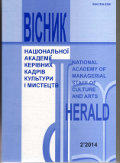EVOLUTIONARY TRANSFORMATIONS OF СULTUROLOGY
DOI:
https://doi.org/10.32461/2226-3209.2.2014.137936Keywords:
evolution, culturology, human, picture of the worldAbstract
In the article, the essence of the evolutionary transformation of culturology is considered taking into account the reflection of worldview of the human in his real and unreal perception of the world. Extremely broad interpretation of pictures of the world comes out not only from the system of human knowledge, but also from a cognitive process in the system of the existing worldview and of understanding of the world.
The process of formation of structure and different directions of modern cultorological knowledge inUkraineare examined. The attention is paid to the fact that the subject range of cultorology can be defined depending on the aims of cultorological perception.
In the article the reveiling of the inscape, integration structures on the symbolic and conceptual levels are shown as the problem of analysis of the processes of development and functioning of culture. It is stated that transformation of culture influences the exposure theoretical structure of the model of culture that is studied. Model of the culture evolution becomes abstractive ideal construction that reflects modern human outlook in its real and unreal perception of the world.
Attention is paid to the fact that in the process of cognition human creates his own model of the world, where the world pictures reflect the different forms of life, natural, social, cultural, political and others. In addition, the world picture is part of the world model, imprint of different verges of a real life, where the spiritual turns into material and vice versa.
The world model consists of innumerable amount of the world pictures which human needs to determine his location in the world and conscious integration into the real existence.
It is stated in the research that there were pre-conditions of revision of the world picture in science and different practices of the XX century, both in natural science disciplines and at more general level. In the modern human consciousness , as well as human of the certain epoch all these features are combined in the unified whole, as consciousness in his real life is not abstract consciousness in general, but individual and public consciousness which acquires development and has specific subject-matter in every historical epoch.
Cultorology enables interdisciplinary research, where the evolution of culture is examined as an integral system with the dynamic cycle of the structural functioning.
The evolution of cultorological idea shows that its priorities are changing in the aspect of determination of the specific of functioning of different elements of the culture model, which are the result of translation of the world picture from generation to generation.
Integration of all elements of culture into the system, that is self-organized, appears to be rather perspective object of cultorological analysis, further research of which is able to expose the features of essences of modern life of culture, in particular, co-operations of traditional and innovative, steady and historically changeable.
Downloads
Published
Issue
Section
License
Authors who publish with this journal agree to the following terms:
1. Authors retain copyright and grant the journal right of first publication with the work simultaneously licensed under a Creative Commons Attribution License International CC-BY that allows others to share the work with an acknowledgement of the work's authorship and initial publication in this journal.
2. Authors are able to enter into separate, additional contractual arrangements for the non-exclusive distribution of the journal's published version of the work (e.g., post it to an institutional repository or publish it in a book), with an acknowledgement of its initial publication in this journal.
3. Authors are permitted and encouraged to post their work online (e.g., in institutional repositories or on their website) prior to and during the submission process, as it can lead to productive exchanges, as well as earlier and greater citation of published work (See The Effect of Open Access).


